#dyscalculia awareness
Text
I just wanted to say that it's not too late to learn something you've always wanted to, or relearn something you really struggled with in school.
I have dyscalculia. It's a math learning disability that most people - including teachers and clinicians - don't really know about. I was a straight A student - except when it came to math, which I just couldn't understand no matter how hard I tried. I went through school thinking I was a failure, I was stupid, and I didn't receive the help I truly needed because neither myself nor my teachers knew I had this learning disability. I was diagnosed with dyscalculia after I graduated from school and everything just made sense. I was a little bitter I didn't find out when I most needed it though. I thought it was too late for the longest time and I'd just never understand math. It was a lost cause at that point.
I am almost 30 years old. This week I just purchased a seventh grade math workbook. It still doesn't make much sense to me but I'm slowly making my way through it.
It's not too late for me, and it's not too late for you either.
#dyscalculia#dyscalculic awareness#adhd#learning disabilities#it's not too late#my post#my posts#thekindermouse#text post#math#struggling with math#student#learning#education#dyscalculia awareness
9 notes
·
View notes
Text

Day 53 of Pride Flags Drawn as Foxes: Dyscalculia flag
#art#digital art#artist#digital arwork#digital painting#artists on tumblr#painting#fox art#dyscalculia#dyscalculia awareness#disability pride#disabled#disability#disabilties#disabled artist#disabled pride#disability pride month#actually disabled
49 notes
·
View notes
Text

#actually dyscalculic#dyscalculia#dyscalculia awareness#education#girl#glow up#graduated#hello kitty#inspiration#kawaii#learning disorder#life#meaningful#mirror selfie#motivation#no it doesn‘t mean i don‘t know how to calculate#sanrio#study motivation#studyblr#studyspo
9 notes
·
View notes
Text
Guess who discovered they're not an idiot, 'smart except for math', 'yeah I just can't count lmao' or not trying hard enough but instead they're getting a dyscalculia diagnosis?
Yeah it's me.
We really need to work on the dyscalculia awareness bc I had no idea it's a thing and spent many years thinking I am stupid
#dyscalculia#dyscalculia awareness#neurodiversity#neurospicy#like who was going to tell me?#noone apparently
4 notes
·
View notes
Text
Shout out to people who can not tell the time
Shout out to people who need a little longer to figure out the time
Shout out to people who can't do "quick" maths in their head
Shout out to people who need to use a calculator for even "simple" maths
Shout out to people who need others to read number a for them
Shout out to people who cry over maths and numbers
Shout out to people who say the wrong numbers when reading or talking about prices and the time of day
Shout out to people who can't read charts and graphs
Shout out to people who get confused with mathematical concepts
Shout out to people who can't read music because it seems mathematical to them
Shout out to people who's maths struggles limit them
Shout out to people with dyscalculia or math struggles, basically. I am with you. I am here for you. I see you. It sucks, and most of the world doesn't even know about dyscalculia. But it'll be ok. It won't go away but people will help you, you can adapt. I love you. Screw math ❤
#dyscalculia#discalculia#it's not just “math dyslexia” by the way#It's so much more than “just maths dyslexia”#not saying people with dyslexia have it better off at all just saying it's a different disorder and we have no awareness or visibility#neurodivergent#neurodivergence#neurodiversity#I hate maths#learning disability#learning disorder
3K notes
·
View notes
Text
Brief Dyscalculia Simulation Activity

https://www.tiktok.com/t/ZTRC6XtkX/
0 notes
Note
Hey, love the post you make about obscure disabilities. Could you make/ have you made about dysgraphia?
Sure. This will be my post for disability pride month tomorrow. Which I'm posting now because I don't have the spoons to schedule it for tomorrow.
I hope you don't mind I turn this into a combo one because I have a hard time mentally processing one of these conditions without understanding all three.
(Obligatory I do not have any of these conditions. This is not meant to be a diagnostic tool. Please do your own research. I'm only answering a question that was asked of me and it's really hard for me to explain one of these without explaining all of the similar conditions to differentiate them.)
And I hope that you don't mind my poorer language skills right now I'm recovering from a server sinus headache I've had all day.
Dyslexia vs Dyscalculia vs Dysgraphia (bonus round Dyspraxia)
These issues have like, a 30% comorbidity rate. So if you have one there's a 30% chance you'll have either of the others. People with conditions may be perceived as "slow" but they are not intellectual disabilities (Not that there's nothing wrong with intellectual disabilities. I'm just pointing it out because people will say "you can't have dyslexia. You're so smart.")
But the fact that they're comorbid and often comorbid with autism and adhd causes some misunderstandings around the conditions because people think they have one condition and attribute all of their issues to the one condition with no knowledge that its not just one condition they're expressing.
Dyslexia
Dyslexia is characterized by the limited processing and comprehension of graphic symbols, particularly those regarding language. People with it have poor reading skills, flipping letter sequences and words, and poor handwriting. Although it is a learning disability, it's important to note that dyslexia does not impact a person's intelligence, although they may seem slower due to poor language processing skills. (There's nothing wrong with disabilities that impact intelligence, I just don't want people saying "he can't be dyslexic because he's so smart".)
Many representations of dyslexia often exhibit letters tap dancing across the page, shape shifting, and doing backflips. It's important to note that these are incorrect representations, because it's really hard to give a visual representation of what people with dyslexia experience. However, it's really harmful to express dyslexia in this fashion as it leads to people thinking that they don't have dyslexia when they actually do.
As I understand it, dyslexia is the eyes/ brain being able to flow seamlessly when reading large blocks of text. Ways to combat this is cut out a strip to block off lines when you read them. Use a highlighted strip of paper to highlight lines as you read them.
Fun fact, there's a few fonts that space the letters well enough and differentiate similar letters enough that make it easier to read. Comic Sans font is the most widely accessible accessibility tool for dyslexic people as it's one of the easy to read fonts that on every machine. (These accessibility tools have proven to make everyone read faster, dyslexia or no. But people with dyslexia have found them instrumentalin functioning. )
Another fun fact. Rick Riordan wrote Lightning Thief so that his dyslexic son could have representation in a character that had the same disability as him.
Dyscalculia
Dyscalculia is often called "math dyslexia". People with Dyscalculia have issues with numbers. They have poor math skills, issues interpreting graphs, issues doing basic arithmetic, issues understanding things like place value, issues understanding time especially when it comes to reading an analog clock, and issues seeing patterns. This often causes a high level of anxiety around math. Some reports say these people have issues with directions, remembering locations, and reading maps (though research is inconsistent on that one).
Dysgraphia
Dysgraphia is easy to mix up with dyslexia, which is why I needed to write all these out. Where dyslexia is difficulty reading. Dysgraphia is difficulty writing. Symptoms include difficulty writing words, expressing thoughts in written form, and organizing and processing your thoughts. This can cause issues with social communication for obvious reasons.
These people also may have fine motor perception issues, writing in a straight line, spacing their letters correctly, etc. Especially fine motor skills around writing. They may also have issues with grammar, punctuation, and capitalization.
Bonus Round:
Dyspraxia
This one gets mixed with dyslexia two. Dyspraxia is issues with spacial awareness. They often say they can't tell where their limbs are in space. They may have issues with coordination, walking in a straight line, and balance. It's very hard for me to conceptualize, but people that have it may say that they bang their limbs against things due to poor spacial awareness. Which honestly, relatable. I've slammed me calf into a door before. And my shoulder blade. How? Good question.
These people have issues in social situations because their entire focus will be on their coordination, not making a mess, and not making a fool of themselves, etc. Their issues actually get better when they drink because the stress of sucked situations makes it worse and alcohol loosens them up. (I'm not advocating for drinking, but saying that the issues resolving when your drink validates your dyspraxia, not invalidates it.)
I think a lot of people that know of the condition may think people with low depth perception have dyspraxia. A lot of people have told me they think I have dyspraxia because my lack of depth perception negatively impacts my spacial awareness.
-fae
#disability#disability pride month#disabilties#disability awareness#disability pride#disability awareness month#dyslexia#dyspraxia#dysgraphia#dyscalculia#adhd autism
256 notes
·
View notes
Text
my actual toxic trait is I have the opposite problem of those people who think mexico doesn't have big cities or infrastructure and stuff. I have had how small england is compared to the average american state drilled into me to the point that now I have to remind myself it's not one big city surrounded by like a few dozen acres of cottages and fields. like ofc egypt and mexico and brazil and india have big cities and shit, england tho....uh...idk man it's just pubs and grass right? sheep. hills. a river.
but also I kinda have the same problem with rhode island and most of the american north-east so maybe growing up in the great plains just did something fucked up to my brain and now I cannot conceptualize a place that's not so big it's literally has a form of insanity named after it
#THIS IS A JOKE PLEASE I PAYED ATTENTION IN SCHOOL I KNOW I'M BEING SILLY#I'M JUST BAD A CONCEPTUALIZING SIZE SO SMALLER COUNTRIES AND STATES CONFUSE ME#SEND ME BACK TO THE PLAINS I MISS MY PRAIRIE MADNESS#MY SPATIAL AWARENESS IS FUCKED MY BRAIN IS FULL OF HOLES DYSCALCULIA IS A BITCH#I THINK A CAR COULD FIT IN MY BEDROOM I DON'T UNDERSTAND SIZE
30 notes
·
View notes
Text
A Primer on Dyscalculia: The Learning Disorder You Weren't Told About in School
I rarely see people discussing this learning disability, to the point that many believe it doesn't exist (ie, saying math is the universal language and everyone understands it but just doesn't try) so I thought I'd explain a bit about what it is.
Dyscalculia is a learning disability characterized by difficulty with math, numbers, and some systematic learning that requires the use of memorization and application. Like its relative, dyslexia, it is not that someone is "stupid" or "not trying hard enough" to learn math; our brains are essentially wired not to absorb information in this form.
Common symptoms of dyscalculia include:
Inability to do basic math problems
Struggling to count, often using their fingers to count
Difficulty using multiplication and division
Challenges with visualizing heights, lengths, and widths
Difficulty counting change
Struggling to read a clock or divide time into reasonable measurements
Challenges with memorizing numbers, dates, and sequences
No one is actually sure how many people have dyscalculia because it is rarely diagnosed. Right now, estimates are around 3% to 7% of the population, but this is likely a vast underrepresentation.
Educators still believe the myth that everyone can do math and that those who say they can't are just refusing to apply themselves. This causes lifelong problems for dyscalculiacs because if not treated early enough, it is nigh-on untreatable.
Many people with dyscalculia may complete math problems in unusual and time consuming ways. For example, if you asked me to divide 145 by 5 without a calculator, this is how my brain would have to do it:
100 by 5 (20)
20 by 5 (4), then multiply this by 2 (8), then divide 5 by 5 (1)
And finally, add up all the results (20+8+1) to get 29.
Numbers that are not easily divisible or "chunked" like this would be nigh-on impossible for me to do in my head. I wasn't able to memorize the times tables and in fact needed a laminated times table well into elementary school (think 5th grade).
I distinctly remember feeling like everyone else was on the helm of the USS Enterprise when they could so easily shout out answers to simple multiplication or division problems, and I was always the last person to do those stupid times table sheets. Sometimes I couldn't even complete half of it by the time everyone else was done.
I failed 3rd grade math class and had to be assigned a tutor. This was despite getting all As in every single other class. In fact, I failed multiple math classes during my academic career.
Since my grades were so high in other classes, I had to petition to be put in a remedial math class. Everyone assumed that because I did well in things like English, science, civics, and so on, I must have been able to do what my peers could.
A college-level physics class was the hardest class I have ever done in my life, and I have a Master's degree in International Relations, which requires a lot of very dry and complicated political theory. That is the A I am most proud of because it required far more effort than anything before or since.
No one told me what dyscalculia was or identified a problem throughout my entire time in education. I had to seek out resources myself in adulthood before finally learning what my problem was. This, of course, led to significant "math fear" and self-esteem issues, especially in a society that is obsessed with STEM.
This learning disability can have far-reaching effects and impact things that other people may not even consider. There are many connections between systematized learning and math.
Dyscalculiacs may also have trouble with:
Learning languages
Playing musical instruments (because sheet music and tempos are a form of language + math, though it is possible to learn by ear)
Reading maps, including general world geography
Estimating distances
Navigating a new place because they can't make "mental maps"
Dancing (due to the sequencing)
Reading diagrams
Remembering step-by-step instructions without a cheat sheet
Completing complex tasks that have a lot of steps
Starting a project that necessitates doing things in a certain order, such as building something
Cooking or baking (because it requires measuring and matching measurements to specific ingredients)
Repeating sequences, like a phone number
Remembering numbered streets or highways (like I-480, 5th street, or etc)
Playing games that require counting or keeping score, like Yahtzee, card games, and so on
Completing spreadsheets with numbers
Of course, not every dyscalculiac will struggle with all of these things because there are different degrees of severity. Many also learn tactics to compensate. For example, I never learned sheet music but did well in choir because I memorized all the songs entirely by ear.
I have developed visualizations of common routes I travel and can navigate to them by remembering the landmarks I pass. If you tried to ask me specific step-by-step directions of anywhere, I couldn't tell you, but I can tell you that you'll pass a KFC on your right if you're going east (parallel to Lake Erie), and then you will turn left at the big shopping center.
There are plenty of adaptations that everyday people use which are lifelines to dyscalculiacs in ways that other people may never recognize. Formulas on spreadsheets, conversion websites, built-in calculators, and turn-by-turn navigation apps are all examples of accommodations that appeal to everyone but are especially important to dyscalculiacs.
So, the next time you scoff and say "everyone can do math, they're just being lazy" or "cooking is easy" or "anyone can learn a second language if they want to" or "using a calculator is cheating" and so on:
Recognize that you are ignoring a very real learning disability. These statements are ableist.
Such rhetoric is equally damaging as anti-dyslexic statements like "everyone can learn to read," "open dyslexic fonts are ugly," "audiobooks are cheating," "video lessons are lazy" and things of that ilk.
Ableism takes many forms, many of which people refuse to recognize. Difficulty with math is a widespread problem, and it often has nothing to do with trying hard enough or refusing to learn. I remember breaking down in tears trying to do my times table; I would spend hours trying to understand them.
These issues are NOT a lack of willpower or application. They have to do with real neurological deficits. Please be kind to those who can't do math, and stop assuming we're lazy.
#learning disability#learning disorder#neurodivergency#neurodiversity#neurodivergent#dyscalculia#actually dyscalculic#disability#disability rights#invisible disability#disability justice#accessibility#disability awareness#disability advocacy#actually disabled#disabilities
20 notes
·
View notes
Text
That neurodivergent feeling of relating to all but also none of the questions in your diagnosis process due to multiple types of neurodivergency
You either scream 'YES', 'NO' or 'IDFK'.
#how do you write neurodivergent oml#thank God for vocal text#neurodivergent#neurodivergency#dyslexia#autism#dyscalculia#adhd#dysgraphia#ocd#tourette's syndrome#nd#awareness#borderline personality disorder#personal shit
21 notes
·
View notes
Text

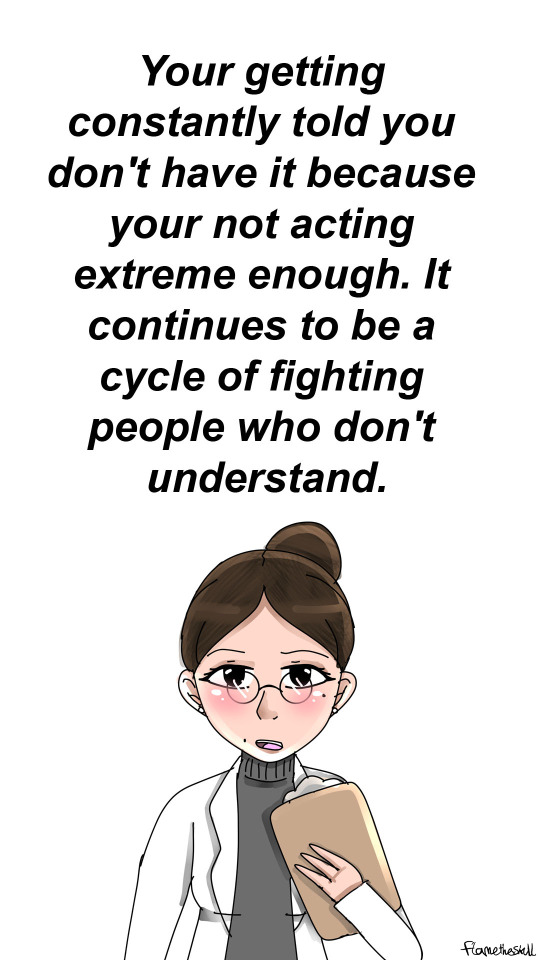

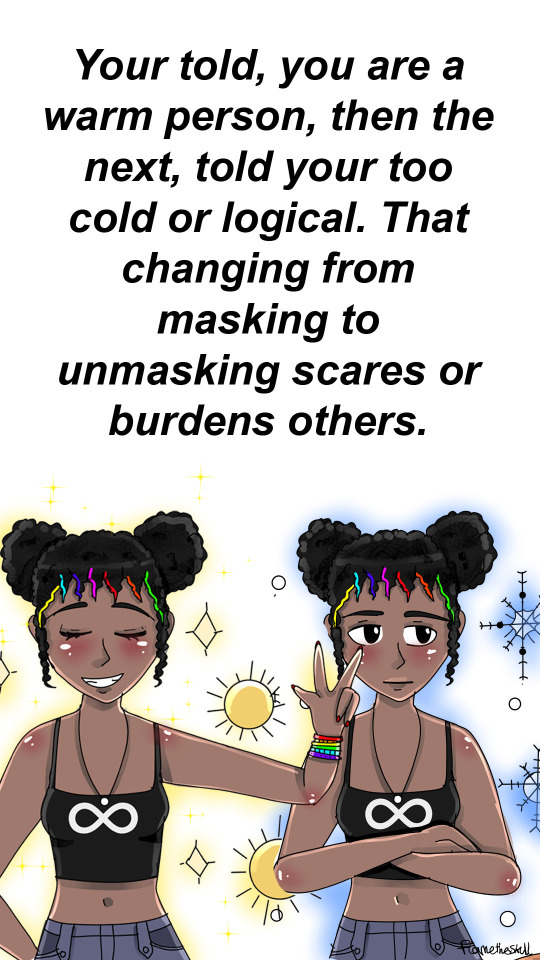
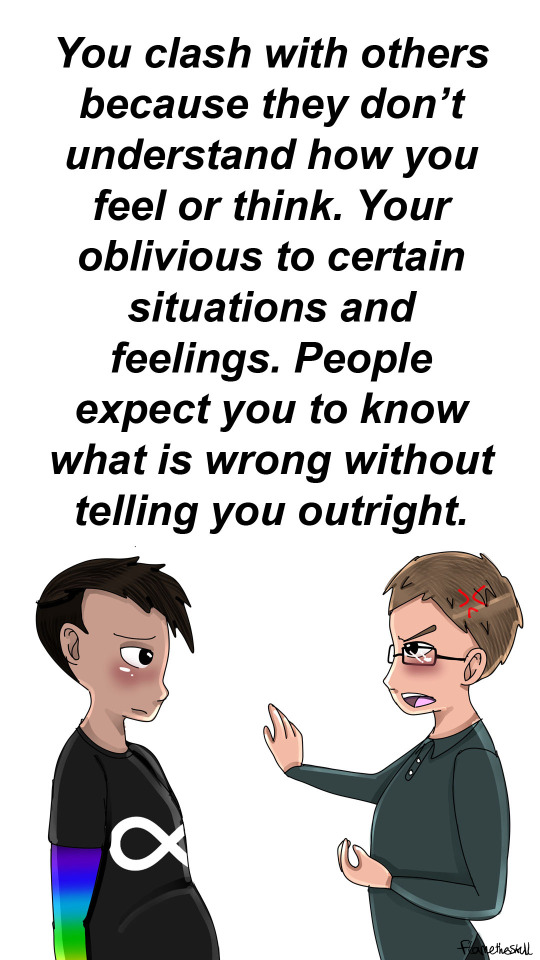
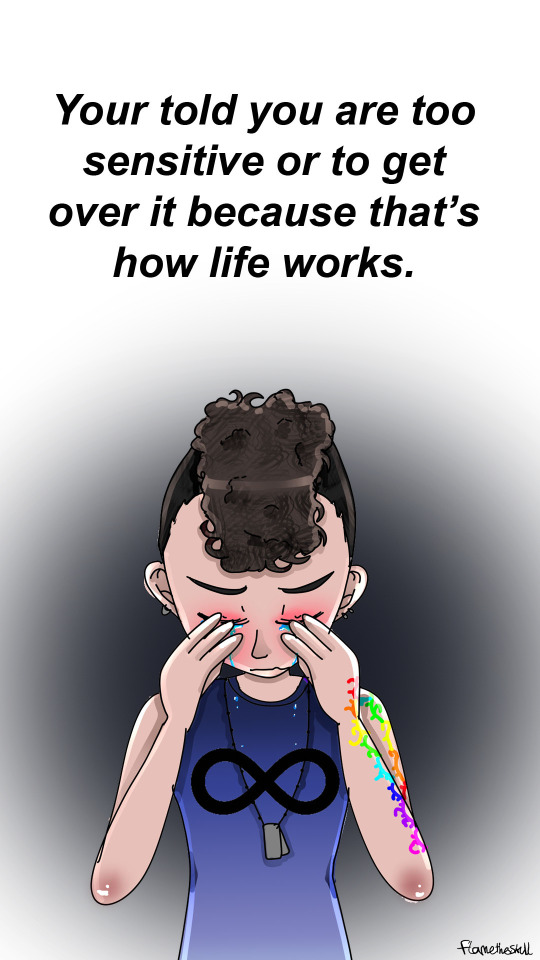
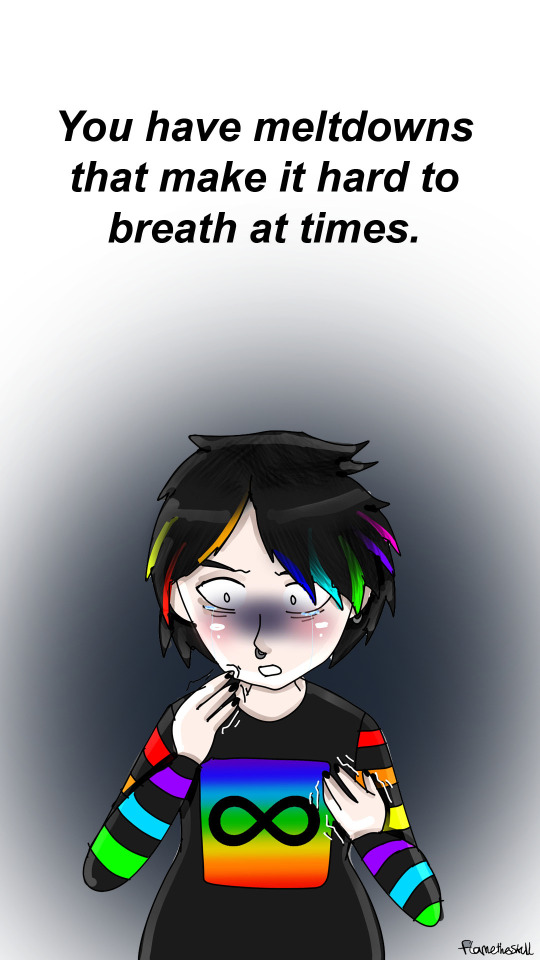

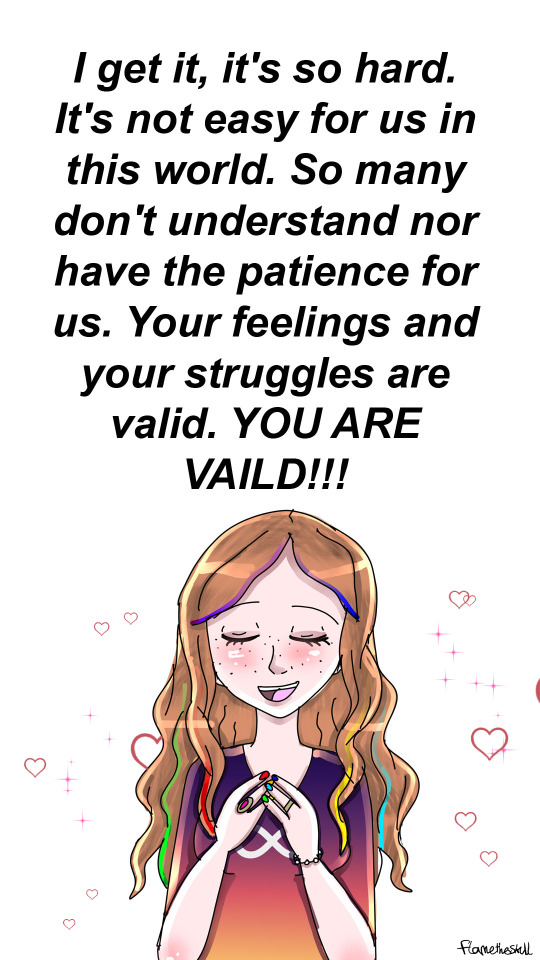
A comic about Autism. I hope some of you can relate.
#autistic artist#autism#autistic experiences#autistic#autism awareness#autism comic#autism community#OCD#ADHD#AUHD#dyslexia#dyscalculia#autoimmune disorder#autoimmune disease#bpd#ptsd#cptsd#bi polar#anxiety#depression#neurodivergent#neurodiverse artist#comics
56 notes
·
View notes
Text
Story time: So I had just recently discovered that dyscalculia (or math dyslexia) is a thing, which is a learning disability that affects your ability to do math and other number-related things. I’m definitely sure that I have it, but I didn’t tell anyone about it. I didn’t think anyone would know what I was talking about, and I’ve been out for school for a while and have never needed to use math.
Anyway, I’m working at the movies one day and I’m ringing up this woman’s popcorn order. The computers we use at the register will automatically calculate the change for you (which was a life saver for me!) But one day I hit the wrong button or something. I asked my coworker what to do and he said that it was fine, but I would just have to calculate the change myself.
Now the woman in line must have seen the look of horror on my face because she says to me “You can do it! I’m a math teacher, you can do it!”
I thought this was very sweet but also hilarious. I don’t know how she thought telling me she was a math teacher was going to help me, also I appreciated her belief in me but she has not seen me do math!
So I laughed it off and said “Yeah, numbers are definitely not my strong suit. If math dyslexia was a thing I’m sure I have it.” To which my new math teacher friend very confidently replied “It is.”
My coworker ended up doing the calculation for me and we just moved on. I am still terrible at making change and I have no intentions on practicing. But the point of this story is that I’m just glad that that math teacher is out there. Because I’m not sure how many math teachers will actually acknowledge that dyscalculia exists. For my whole life I struggled with math classes and didn’t learn about this disability until after I graduated college. If I had known before, if my teachers had known before, it probably would have saved me a lot of struggle.
So to that math teacher who so strongly believed in me that day, I just wanna say thanks. Your students are very lucky to have you.
#dyscalculia#actually dyscalculic#adhd#learning disability#math#adhdlife#adhd stuff#adhd culture#adhd mood#adhd awareness#adult adhd#living with adhd#neurodivergent#story time#true story
306 notes
·
View notes
Note
GIRLLL ARE YOU OKAY??? I follow you for a while and I don't remember you being off for SO LONG 😭 Wanted to send you a message but since I don't interact that much with people here I thought that would be weird....Anyway come back PLEASE I miss your fics very much you're like the Queen of jalice fandom 😭😭😭
Oh Anon, this was so sweet of you.
I'm alive, and I'm okay! Long story short: ongoing health issues that flaired up, and I took two classes this semester thinking that I could balance everything. And I could not. My focus had to be on my classes.
I promise I'm coming back. I've got three chapters nearly done, I've got more ficlets for posting, I have a week and a half until our final projects are due, and then I will be doing nothing but writing fic until the end of July.
I promise that I haven't quit writing my fic or left fandom or am trapped in a well. We're optimistic that next semester will have a better balance.
And as an apology and a peace offering, have a snippet.
She looks at him and it’s like he sees the moment she decides. That the heartbreak and terror leave her gaze in a blink, and he’s left staring at the cold, dead eyes of a stranger. Even her emotions change, like someone has flipped a switch - just grey acceptance filling her like smoke.
He’s never known this version of her, and he is terrified. He wants to grab her and shake her and bring her back to life. He wants her to go back to holding onto his arm and begging him not to make her go alone.
(He would rather her sobbing in his arms than this blank-faced stranger, and he hates himself for that.)
#asks#i also have fairly terrible dyscalculia which effects my awareness of time passing#it's an issue#but i'm definitely here#apologies#looking forward to the end of semester#just me sitting around in leggings furiously writing reams of jalice fic#that's the plan for june + july
8 notes
·
View notes
Text
Fr 😭
#autism awareness#autistic#learning disability#learning disabilities#dysgraphia#dyscalculia#dyslexia#adhd problems#actually autistic
6 notes
·
View notes
Text
are people normally like. able to count things once and get the right answer consistently. whenever i count anything i have to do it at least three times to make sure i get the same answer bc i almost always do it wrong the first time. ive just accepted that as How I Count, you just have to count three times, thats how it goes. is that. is that not how it goes
#suddenly hyper aware of dyscalculia now that im training someone at work and realizing how much more effort it takes me to do like#numerical data entry tasks. i Have To triple check my math and my counting#and do it very slowly and carefully with great focus#'i checked the language lesson we're at 85%' 'ok cool' 'so im gonna write that on the-. what number did i say'
2 notes
·
View notes
Text
Brief overview to understand dyscalculia

https://www.tiktok.com/t/ZTRCFrcx3/
#dyscalculia#dyscalculia awareness#learning disability#learning difficulties#math dyslexia#special education#section 504
0 notes